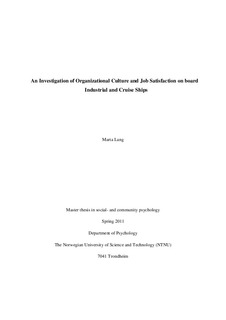An Investigation of Organizational Culture and Job Satisfaction on board Industrial and Cruise Ships
Master thesis
Permanent lenke
http://hdl.handle.net/11250/270658Utgivelsesdato
2011Metadata
Vis full innførselSamlinger
- Institutt for psykologi [2886]
Sammendrag
The overall aim of the study was to examine work environment factors within the maritime industry. For this purpose a new measurement tool for work environment on board ships was developed. Further aims of the study were the examination of organizational culture, occupational stress and job satisfaction. 215 seafarers from 24 ships participated in the study. The response rate was at 35% for the whole sample. In order to investigate differences in organizational culture, a multivariate analysis was conducted, which revealed significant differences in organizational culture due to nationality and hierarchical position. In order to examine predictors of job satisfaction, multiple hierarchical block regression analysis were performed. Occupational stress and organizational culture emerged as significant predictors of job satisfaction. Especially relationships with co-workers and relationships with superiors emerged as predictive for job satisfaction. Social support and feedback from superiors showed the strongest predictive power for job satisfaction. The results in the study emphasize the importance of nationality and hierarchical position as important variables for measuring organizational culture. In addition, the importance of social relationships between co-workers and superiors are discussed.
The aim of the study was to examine whether there were significant differences in organizational culture on board ships when looking at the variables nationality, hierarchical position and ship type. 215 Norwegian and Filipino seafarers from 24 ships participated in the study. The response rate was at 35% for the whole sample. Multivariate analysis revealed overall significant differences for the seven culture dimensions. In addition a significant difference of nation on the two factors (2) Working with the opposite gender and (3) Social support and feedback given by superiors emerged. Further multivariate analyses showed resulted in overall significant differences between hierarchical positions on organizational culture and especially on the factor (3) Emotional involvement in co-workers problems. The results emphasize the importance of including variables as nationality and hierarchical position when studying organizational culture within the maritime industry.
The aim of the study was to examine the dimensions stress and organizational culture as predictors of job satisfaction within the specific conditions of the occupation of seafarers. In addition the impact of Social support and feedback given by superiors on job satisfaction was examined. 215 Norwegian and Filipino seafarers with different ranks from 24 different ships participated in this study. 97 of the respondents reported to be Officers/Managers and 87 of the respondents Ratings/Subordinates. The response rate was 35, 5 % for the entire sample. Multiple hierarchical block regression analysis were performed and revealed both stress and organizational culture as significant predictors of overall job satisfaction. Especially relationships with co-workers and relationships with superiors emerged as predictive for job satisfaction as a part of organizational culture. As predicted the factor Social support and feedback given by superiors had great predictive power for job satisfaction. The results emphasize the importance of organizational culture and especially relationships between the employees on board a ship.
